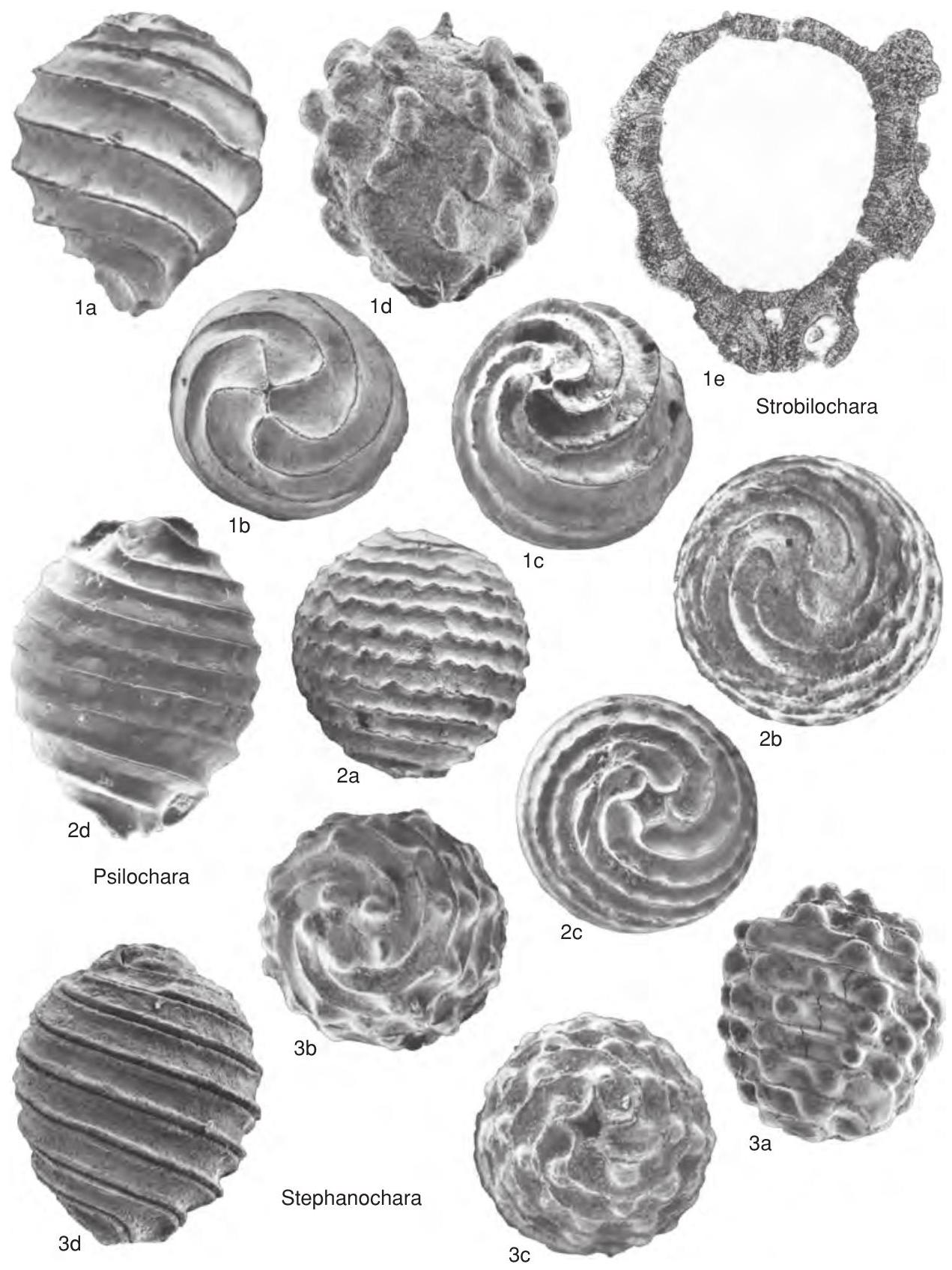Welcome to the Treatise on Invertebrate Paleontology!
Please enter a genera name to retrieve more information.

Stephanochara
Classification
Phylum:
Charophyta
Class:
Charophyceae
Order:
Charales
Suborder:
Charineae
Family:
Characeae
Subfamily:
Charoideae
Formal Genus Name and Reference:
Stephanochara GRAMBAST, 1959b, p. 8
Type Species:
S. compta GRAMBAST, 1959b, fig. 3, OD
Images
(Click to enlarge in a new window)
Fig. 76,3a-c. * S. compta Grambast, lower Oligocene, United Kingdom, a, holotype, lateral view, b, paratype, apical view, C.1230-2, c, paratype, basal view, C.1230-3, x40 (new)., ——Fig. 76,3d. S. berdotensis Feist, lower Miocene, western France, holotype, lateral view, x43 (Feist & Ringeade, 1977, pl. XIII, 1).
Synonyms
Croftiella, Dongmingochara
Geographic Distribution
Europe (widespread), Mongolia, China
Age Range
Beginning Stage in Treatise Usage:
Upper Cretaceous
Beginning International Stage:
Cenomanian
Fraction Up In Beginning Stage:
0
Beginning Date:
100.5
Ending Stage in Treatise Usage:
Neogene (Miocene)
Ending International Stage:
Messinian
Fraction Up In Ending Stage:
100
Ending Date:
5.34
Description
Apex nitellopsidoid, with deep depression and no constrictions at apical periphery, apical nodules strongly developed. General shape prolatespheroidal to prolate and perprolate with apex protruding and base tapered. Spirals smooth or with tubercles. Basal funnel star shaped, sometimes absent. Basal plate variable in thickness, about half as thick as wide. Size medium to large. Differs from Hornichara in having apical zone normally calcified, thicker basal plate, larger size, and possible ornamentation. [FEIST-CASTEL
(1977c) documented the nonvalidity of Croftiella.]
References
Museum or Author Information
Classification
Phylum:
Charophyta
Class:
Charophyceae
Order:
Charales
Suborder:
Charineae
Family:
Characeae
Subfamily:
Charoideae
Formal Genus Name and Reference:
Stephanochara GRAMBAST, 1959b, p. 8
Type Species:
S. compta GRAMBAST, 1959b, fig. 3, OD
Images
(Click to enlarge in a new window)
Fig. 76,3a-c. * S. compta Grambast, lower Oligocene, United Kingdom, a, holotype, lateral view, b, paratype, apical view, C.1230-2, c, paratype, basal view, C.1230-3, x40 (new)., ——Fig. 76,3d. S. berdotensis Feist, lower Miocene, western France, holotype, lateral view, x43 (Feist & Ringeade, 1977, pl. XIII, 1).
Synonyms
Croftiella, Dongmingochara
Geographic Distribution
Europe (widespread), Mongolia, China
Age Range
Beginning Stage in Treatise Usage:
Upper Cretaceous
Beginning International Stage:
Cenomanian
Fraction Up In Beginning Stage:
0
Beginning Date:
100.5
Ending Stage in Treatise Usage:
Neogene (Miocene)
Ending International Stage:
Messinian
Fraction Up In Ending Stage:
100
Ending Date:
5.34
Description
Apex nitellopsidoid, with deep depression and no constrictions at apical periphery, apical nodules strongly developed. General shape prolatespheroidal to prolate and perprolate with apex protruding and base tapered. Spirals smooth or with tubercles. Basal funnel star shaped, sometimes absent. Basal plate variable in thickness, about half as thick as wide. Size medium to large. Differs from Hornichara in having apical zone normally calcified, thicker basal plate, larger size, and possible ornamentation. [FEIST-CASTEL
(1977c) documented the nonvalidity of Croftiella.]
